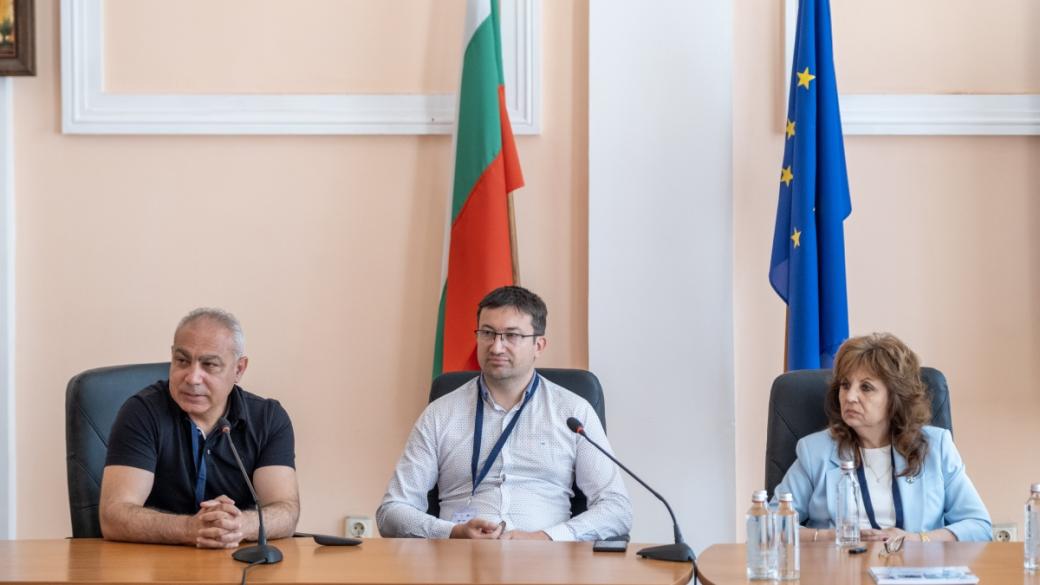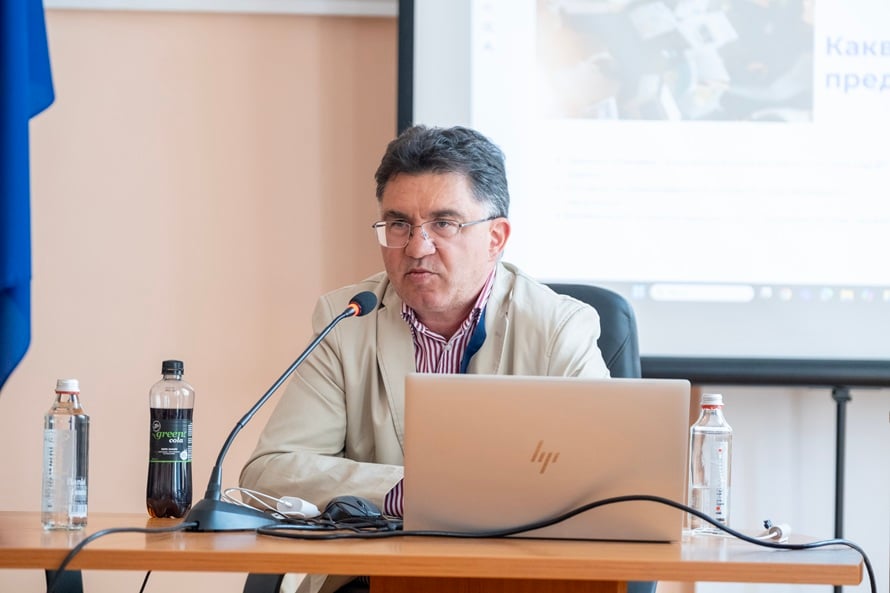“50+ is the new 20”: Kyustendil seeks the formula for sustainable entrepreneurship
Local resources, demographic reserves, and social innovations are proving to be the three pillars for retaining capital and talent in the city

© ECONOMIC.BG / Mirela Vavova
The key to the future of business in the region is combining demographic strategies, local investment, and social mechanisms to keep money and talent in Kyustendil rather than letting them leave the city. This is the main conclusion drawn by speakers in the second panel, “The ABCs of Entrepreneurship,” during the seminar “Entrepreneurship Opportunities in Kyustendil.”
The event was organized by Brand Media Bulgaria as part of the activities of the European project “Career Transition Opportunities” (TOP JOBS).
Three speakers presented different but complementary perspectives on the development of the entrepreneurial ecosystem in the region. Georgi Parvanov (CTeam), Dr. Ivo Anev (UNWE), and Sasho Kovachev (Largo Association) outlined both the large-scale demographic and economic challenges and specific local solutions based on available resources and social capacity.
Silver entrepreneurship and demographic reserve
Georgi Parvanov began with a broad picture of the aging society. According to him, by 2030, half of Bulgaria's population will be over 50 years old, with an expected active life span of at least another 20 – 25 years. Parvanov pointed out that “over 10,000 Bulgarians over the age of 65 registered as actively seeking work last year,” which is a unique record for the employment agency.
Today, people over 50 have nothing in common with previous generations—they are active, looking for work and fulfillment, and don't just want to watch their grandchildren."
Hence the need for new programs for the selection, retraining, and support of “silver entrepreneurs” – people with extensive experience who are already starting their own businesses and looking for investment mechanisms tailored to their profile.
Accelerators and funds are currently geared towards young candidates, but these people have 20-30 years of experience and need a completely different approach."
Parnov proposed a combination of generations in teams and announced plans for an accelerator specifically aimed at the over-50s, as well as a psychological call center to assist with retirement – concepts inspired by experience in England.

Local investment and quality of life
Dr. Ivo Anev developed the theme of “money that doesn't travel” – that real value comes from investment at the local level. He reminded the audience that Kyustendil has thermal mineral waters with temperatures of up to 74 °C and a flow rate of over 23 l/s, and that the Central Baths offer high-quality water.
Local resources – mineral water, clean nature, cultural and historical heritage – can generate quality of life and keep funds here instead of exporting them abroad.
Anev emphasized that low confidence and fear of risk are at the root of capital and talent flight. According to him, people prefer to buy a Mercedes or invest in real estate abroad rather than support a local project. He called for a comprehensive vision and strategy, including coordination with archaeological and environmental requirements, so that new spa hotels and bottling companies respect cultural heritage instead of seeing it as an obstacle.
Social entrepreneurship in action
Sasho Kovachev presented the practical side of social entrepreneurship through the example of the Largo Association, which has been supporting the most vulnerable communities – from homeless people to drug addicts – for 12 years. He explained how the organization has positioned itself as an “advocate” rather than simply a service provider, and how it is finding ways to achieve sustainable economic status through microfinance.
One of the key tools is a small revolving fund from which families receive loans (a bus for transportation, a video camera, sound recording equipment) with deferred repayment for 3 – 5 years. By repaying the money, they expand the fund and help subsequent participants.
Kovachev shared several inspiring examples, including a local vegetable shop that reduced its transportation costs and increased its turnover thanks to a loan for a van, and a young videographer who used a financed camera to shorten the path to an independent career and eventually start a recording studio.
We have never taken any profit from the fund – every penny returned above the principal loan remains to support new people."
Kovachev noted that legislative restrictions (VAT threshold, registration of social enterprises) still hinder the development of the model and called for more flexible regulations and support for social investment.
The three speakers agreed that sustainable entrepreneurship in Kyustendil requires:
- Adequate policies that stimulate both the 50+ generation and young people with equal opportunities;
- Investment in local resources – mineral water, nature, and cultural heritage – as a basis for a higher quality of life and economic activity;
- Social financial instruments targeting vulnerable groups that turn recipients into active entrepreneurs rather than passive beneficiaries.
As Parvanov concluded, “50+ is the new 20” – a generation with experience, ready to start and invest back into the community.
Anev added that “the value of an investment is measured not only in revenue, but also in the quality of life it creates.”
Kovachev summarized that even with minimal resources and a well-thought-out model of trust, real entrepreneurial potential can be unlocked in the most unexpected social environments.
Co-Funded by the European Union. Views and opinions expressed are however those of the author(s) only and do not necessarily reflect those of the European Union or the Managing Authority. Neither the European Union nor the Managing Authority can be held responsible for them.
Translated with DeepL.


 Economic.bg
Economic.bg